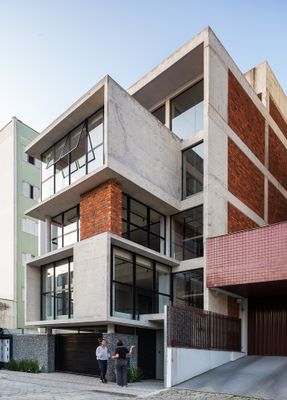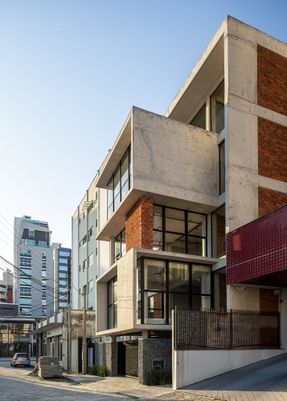Tracker Office Building
ARCHITECTS
VOO® Arquitetura e Engenharia
ARQUITETOS LÍDERES
Jonatan Welter, Mairo Volkmann
EXECUTION
Diego Rodrigues Borges
ELECTRICAL PROJECT
Tesla Engenharia
BUYS
Taynara M. Kuenel, Evandro da Luz
HYDRO SANITARY INSTALLATION
Laércio Murilo Voigt
MANUFACTURERS
GRAPHISOFT, Arte Vidros, Escadas Manske, Esquemátika Informática, Pedras e Styllo
ARCHITECTURE PROJECT
Julian Fonseca Dei Ricardi , Cecília Knaesel, Fernanda Petri, Agatha Savignano, Heloisa Bisewski, Julia Gehrke, Julia Pasold, Bruno Vitorino, Rafael A. Szychowski, Aline Denise Bernardo, Andressa Flach Fuhr, Paulo Moser, Julia Papst, Isaac Moreira Mayorga
SAFETY PROJECT
Laércio Murilo Voigt
CONTRACTOR
Empreiteira Bruske, Alves Prestadora de Serviço
ENGINEERING
Leonardo Leal, Ricardo Anthony, André Bertoldi, Helder Hansen, Alan Franco, Felipe Costa, Geraldo Leite, Laura Kopsch, Rubens Lotério, Bruno Barcaroli
FINANCES
Eduardo C. Fogaça
ART
Thais de Aguiar Hausmann
YEAR
2022
LOCATION
Blumenau, Brazil
CATEGORY
Apartments, Residential
Text description provided by architect.
Tracker Office is a building located in an urban area with an accentuated process of residential, commercial, and corporate growth in the city of Blumenau.
Among taller buildings and with the character of a structure between blind gables, the reduced land has the proposal of a building that aims to fulfill the functionality, bringing the possibility to adapt to the uses and needs of the user.
It is composed of five overlapping floors that occupy the terrain in order to provide a larger quantity of ventilated and illuminated façades related to the surroundings. Under pilotis, the first floor is free and partially open to absorb different functions.
The two subsequent floors are similar to each other and differ in their relationship with the surroundings, resulting in different façade solutions: sometimes inviting the observer to contemplate the wide horizon, sometimes directing him to the free view of the street corner.
Further absorbing the flexibility proposed for the building, on the fourth and fifth floors the intention is to correlate the floors to each other through a double-height ceiling with independent access to the mezzanine.
The modification of the vertical access to the mezzanine results in a different configuration on the last two floors, which have the possibility of performing residential use independently from the other floors.
The mezzanine also gives access to an external vent to the building, set back laterally from the main volume, which makes the last floor possible and also allows a glimpse of the horizon landscape and the sunset from a new perspective for the observer.
Vertically related, the building explores its volumes through the conception of the apparent structure of reinforced concrete, maintaining the lightness through different forms of use of the beams, sometimes used in a common way, sometimes inverted.
This condition of the beams, associated with the relationship with the surroundings and the small eaves in the outer volumes, makes it possible at first sight to perceive thin sheets of concrete overlapping the first floor, creating a pleasant scale from the street.
The experience in applying the material configuration incorporated into the spatiality of the structure allows not only a clear reading of the project but also a play of light and shadow that vary throughout the day in the building.





































